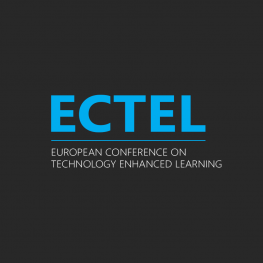Speakers
Gerti Pishtari
University for Continuing Education, Krems, AustriaDaniel Köhler
Hasso-Plattner-Institute, GermanyDenis Ollivier
Université Toulouse Capitole; IRIT; Kosmos, FranceMuhammad Afzaal
Stockholm University, SwedenStart
06/09/2023 - 11:00
End
06/09/2023 - 13:00
Address
Room 40.1.8 View mapSession 2: Learning Design & Learning Activities
Chair:  Tobias Ley
Tobias Ley
Evaluating the Impact and Usability of an AI-Driven Feedback System for Learning Design
Gerti Pishtari, Edna Milena Sarmiento Marquez, María Jesús Rodríguez-Triana, Marlene Wagner and Tobias Ley
Abstract: Despite the momentum that Artificial Intelligence (AI) is gaining in education, its role and impact on teachers’ learning design practices are still underexplored. This paper reports an experimental study (N=38) taking place in a teacher training where an AI-driven feedback system aided teachers in the creation of learning designs. The study analyses the impact that using the AI feedback had on the quality of designs that teachers created, and the usability evaluation of the system. We noticed statistically significant differences between the designs created by the randomly assigned teachers in the experimental (using AI) and control group (without AI), suggesting that AI algorithms specialized to perform specific tasks related to the learning design could help teachers to better meet their design goals. While teachers graded the usability of the feedback system as above average, they also found it easy to use and its functions well integrated. In open-ended questions, teachers expressed doubts about their trust in AI systems and the impact that they may have in school communities, suggesting that future work should explore not only the long-term impact that using AI can have on teachers’ design practices, but also on their perceptions and understanding of the technology.
📄 Read More: https://link.springer.com/chapter/10.1007/978-3-031-42682-7_22
The “How” Matters: Evaluating different Video Types for Cybersecurity MOOCs
Daniel Koehler, Wenzel Pünter and Christoph Meinel
Abstract: Nowadays, Teachers and educators are usually required to transfer knowledge to groups of learners simultaneously. However, not all students necessarily learn in the same way. In cybersecurity education, severe differences between understanding and applying knowledge are observed. In our study, we performed Randomized Controlled Trials with more than 1,500 participants to compare different educational videos: a presentation with slides, an interview, and a short animation. We evaluate learning success for the three dimensions of cybersecurity: Perception, Protection, and Behavior and observe that traditional presentations with slides perform best for achieving fundamental understanding (Perception), tested in recall exercises. Animation videos achieve the best learning success in transfer tasks, such as for assessing protective measures. While statistically insignificant, we observe a slight tendency of animation video learners to apply the learned behavior best, while learners of the interview videos performed worst.
📄 Read More: https://link.springer.com/chapter/10.1007/978-3-031-42682-7_11
Designing a Revision system: An Exploratory Qualitative Study to Identify the Needs of French Teachers and Students
Denis Ollivier, Franck Silvestre, Jean-Baptiste Raclet, Emmanuel Lescure and Julien Broisin
Abstract: Assessment of/for/as learning (formative, summative, self-, peer-assessment), Cognitive and metacognitive mechanisms in knowledge acquisition and construction, Formal education: K-12, Interactive, context-aware, personalised, and adaptive learning systems, Mobile, wearable, and pervasive technologies, Teaching techniques and strategies for digital learning, Tutoring and student support
The design of interactive systems leveraging testing and spacing effects has been poorly studied in ecological contexts. This paper presents an exploratory qualitative study conducted with high school teachers and students to identify hypotheses to guide the design of this kind of system. The resulting hypotheses are: (1) students will access the interactive system with a variety of devices; (2) the presence of a revision system will induce more testing activity during revision but (3) still massively before exams. (4) Teachers would like to have access to nominative indicators to set up personalized monitoring. (5) Students and parents will consent to share personal data with teachers. These hypotheses will be tested with a quantitative study based on data collected through questionnaires and through a first version of the revision tool.
📄 Read More: https://link.springer.com/chapter/10.1007/978-3-031-42682-7_20
A Transformer-Based Approach for the Automatic Generation of Concept-Wise Exercises to Provide Personalized Learning Support to Students
Muhammad Afzaal, Jalal Nouri and Aayesha Aayesha
Abstract: Providing personalized support to students during courses is essential to facilitate them in their desired learning goals and reduce the dropout rate. Although teachers can play an effective role in providing personalized support, achieving individual-level assistance for massive courses becomes challenging. To overcome this challenge, this paper proposes a transformer-based approach that first models students’ knowledge of various course concepts based on their performance in various assessed tasks. Afterwards, the students’ concept-wise knowledge level derived from the models is combined with the available course material, leading to the generation of personalized concept-wise exercises by employing fine-tuned Text-to-Text Transfer Transformer (T5) architecture. These generated exercises help students to improve their knowledge about different course concepts. The proposed approach has been evaluated with various university courses to determine its quality, utility and effects on students’ academic performance. The evaluation results revealed that teachers and students were satisfied with the quality of the generated exercises, and these were found to be helpful for students to improve their concept-wise understanding. Furthermore, the generated exercises positively impacted students’ academic performance.
📄 Read More: https://link.springer.com/chapter/10.1007/978-3-031-42682-7_2



